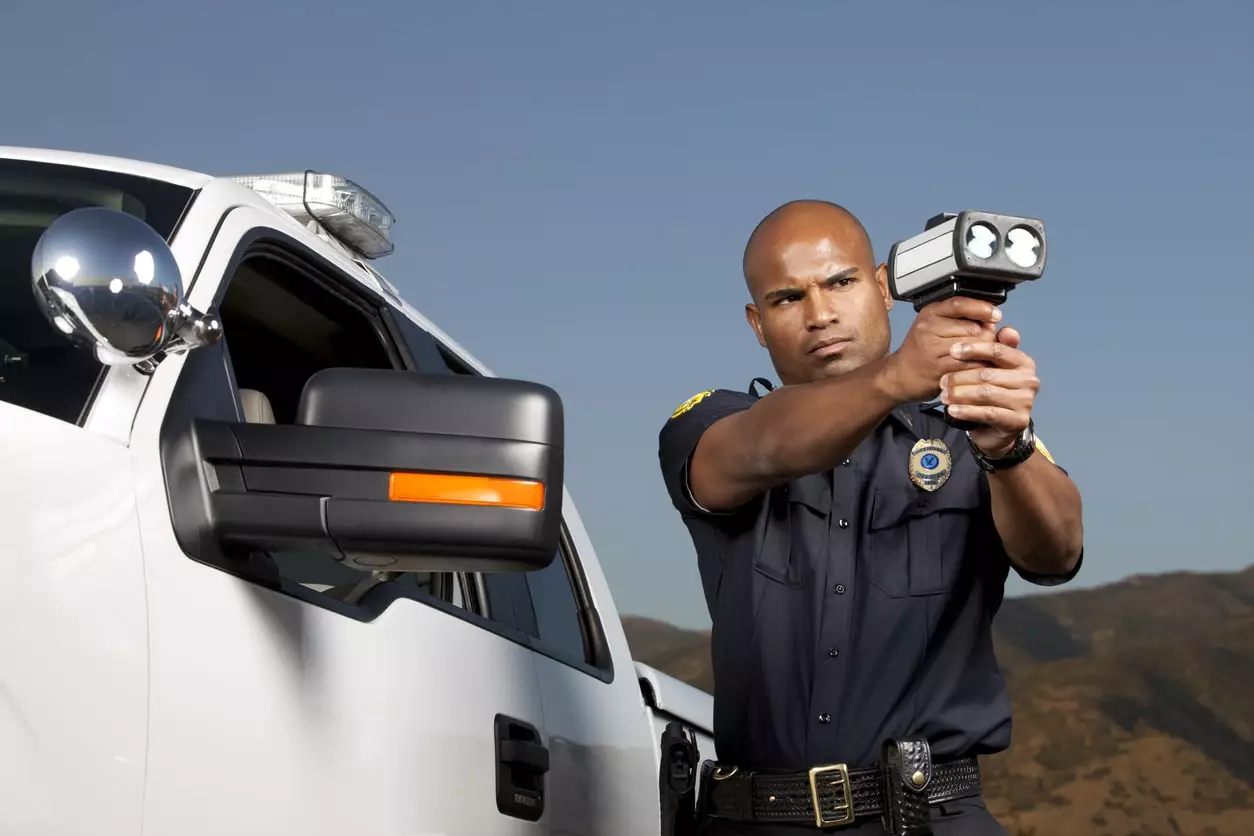 What Is a License Plate Reader and Can Police Track You Using It?
What Is a License Plate Reader and Can Police Track You Using It?
Table of Contents
- Vermont License Plate
- Vermont License Plate Design and Formats
- Vermont Vanity License Plate
- Most Popular Special License Plate in Vermont
- Vermont License Plate Lookup
- What Do I Need to Get a License Plate in Vermont?
- Differences Between a Passenger License Plate and Commercial License Plate in Vermont
- How to Renew a License Plate in Vermont
- How To Transfer a License Plate in Vermont?
- Vermont License Plate Lookup Frequently Asked Questions (FAQ)
 Vermont License Plate
Vermont License Plate
Vermont license plates are number plates used as a means of identification for all vehicles in the state. A license plate is proof of vehicle registration in a state. They are issued by the Vermont Department of Motor Vehicles (DMV). Likewise, the DMV in Vermont is responsible for vehicle registration and issuing a paper registration card in the state. According to the Vermont Vehicle Code, all vehicles, including trailers, semi-trailers, cars, trucks, boats, snowmobiles, motorcycles, motor-driven cycles (mopeds and scooters), and all-terrain vehicles must be registered before they are used on Vermont's highways or roads.
The Vermont DMV issues these types of license plates to vehicle owners in the state:
- Standard License Plates: This is the type of license plate you get when you first register your vehicle.
- Low Number License Plates: If you are looking for a license plate that is unique or you want to acquire an old license plate belonging to your family member (low specific family license plate) you can apply at the DMV to obtain this type of license plate.
- Specialty License Plates: You can apply to change your current plates to specialty plates in order to reflect your interests or resonate your hobbies.
- Conservation Plates: Conservation plates feature designs related to animals and nature, such as the brook trout, deer, and the loon. This license plate creates public awareness to support and protect wildlife.
- Sample License Plates: Sample plates come in sample formats consisting of all 0s. You can apply for this kind of license plate if you have an agricultural, American Legion truck, autos, antique, or antique motorcycle license plate.
You will obtain two license plates from the Department of Motor Vehicles when you register your vehicle in Vermont. One license plate will be fastened to the front of your car and the other at the rear. But if you have a motorcycle, tractor, truck, semitrailer, or trailer, you will be issued one license plate. The Vermont Department of Motor Vehicles (DMV) issues license plates either in pairs or alone, and the letters and numbers on a plate must be visible and clear for easy vehicle identification. The state's license plate displays "Vermont" at the top center of the license plate embossed in white color and the slogan "The Green Mountain State" written at the bottom of the plate.
Since November 2023, Vermont has not required its residents to get date validation stickers on their license plates; this was signed into law on June 1, 2023. This law eliminated the annual or biennial validation stickers that were attached on license plates.
 Vermont License Plate Design and Formats
Vermont License Plate Design and Formats
Vermont license plates are rectangular in shape and consist of alpha-numeric characters. The license plate is made up of six characters; three letters followed by three numbers. A Vermont license plate has a dark green background. It has a screened white rectangular box around serials and a white sugar maple at the top left corner of the plate.
A specialty license plate usually carries a slogan at the bottom of the plate. Vermont issues specialty plates to both passenger and commercial vehicles. You can combine letters, numbers, and spaces for your specialized plates. However, you should use no more than 2 numbers in combination with letters. The letter "O" will be a number (zero), dots, dashes, or other special characters or symbols cannot be used. In addition, a single letter plate is acceptable, but the letter must not be an "I", "J", or "O". You can also use a maximum of 7 characters except for antique and exhibit plates, which have a limit of 4 characters. Disability license plates are limited to a maximum of 5 characters. Motorcycle and small trailer specialty license plates are required to have a maximum of 6 characters.
Standard License Plates for automobiles, commercial vehicles, and motorcycles:
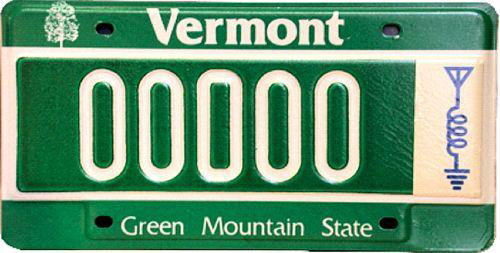
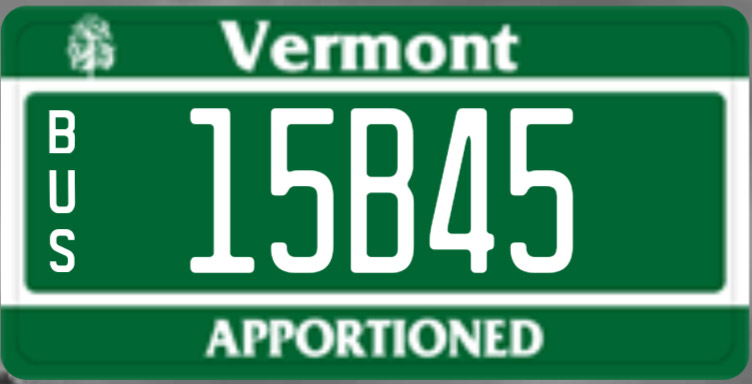
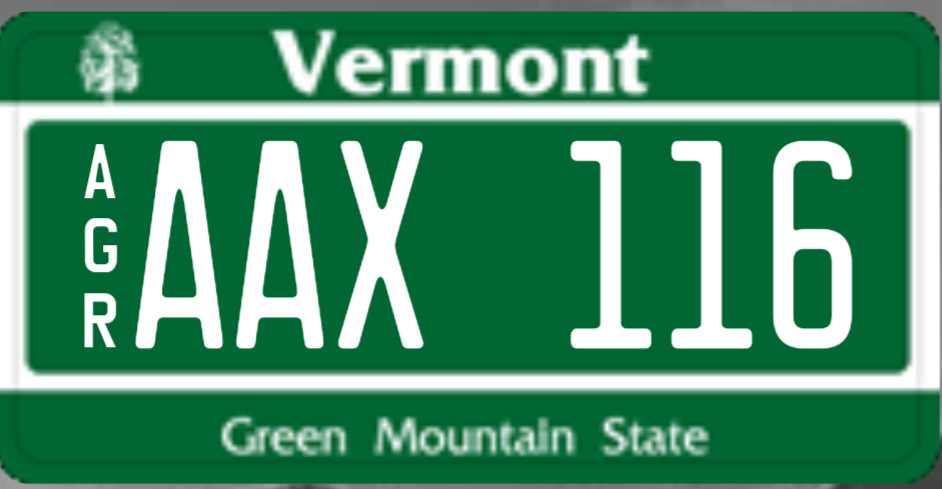
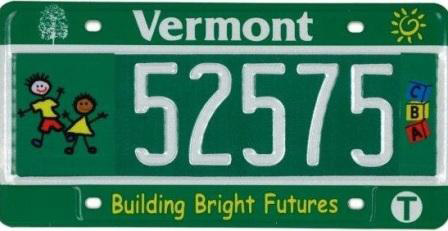
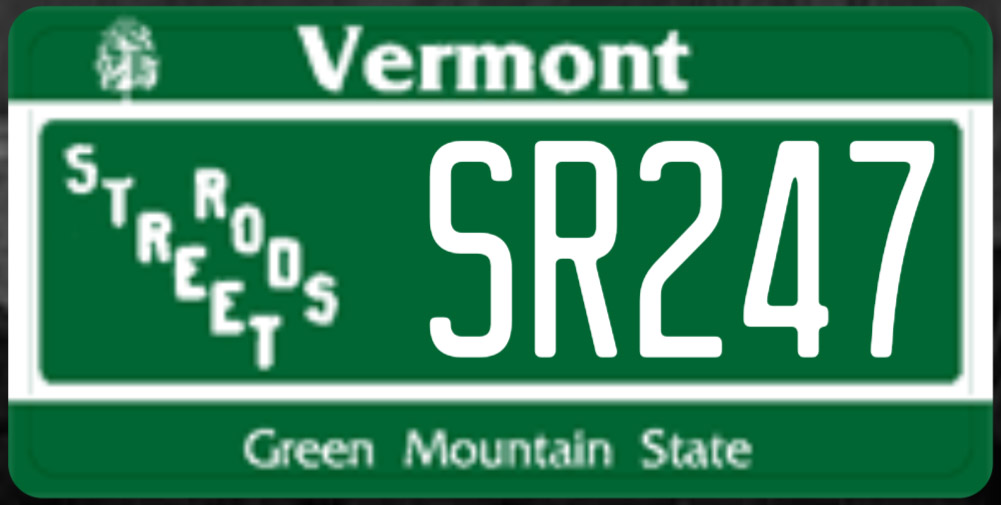
Special License Plates:
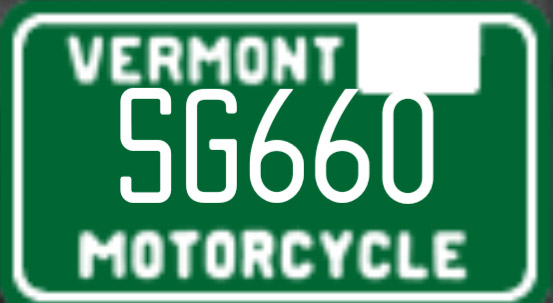

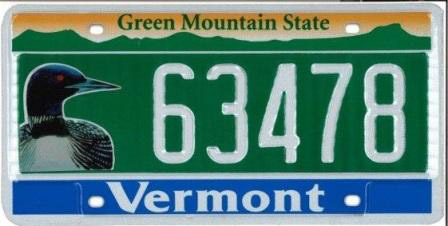
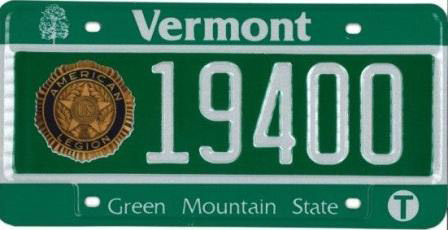
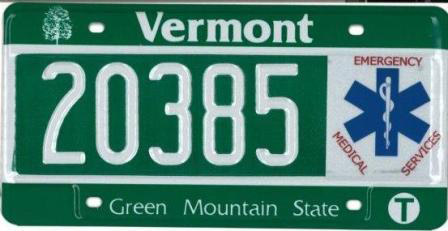
 Vermont Vanity License Plate
Vermont Vanity License Plate
Vanity license plates are customized plates owned by residents who want to showcase their affiliations to groups, signify their hobbies, and interests. If you want to personalize your license plate or add a unique touch to suit your taste, you can apply for a customized license plate in Vermont.
The Vermont Department of Motor Vehicle issues these types of vanity license plates:
- Personalized License Plates: These are custom made plates that express your personality and taste. They are usually rules about ordering one and they are of standard sizes
- Organizational License Plates: These types are given to residents who show membership of certain registered organizations. They feature designs related to these organizations. You can make use of specific messages or combination of letters and numbers when you request for organizational plates
You can personalize both standard and specialty license plates in Vermont. To personalize a standard plate you need to complete a special plate application VD-017 form by visiting the Vermont personalized plate website, submit your application by mail and pay the annual registration fee and an additional annual fee to the DMV in Vermont. The application fee and process for specialty plates vary depending on the license plate type.
Personalized plates cost $58 annually, in addition to Vermont's vehicle registration fees and any specialty plate fees. To apply you should visit the Vermont DMV website, click on your desired plate, fill an application form, and pay the required fee. This fee usually varies depending on the specialty plate type. Specialty license plates like Building Bright Futures and Conservation license plates cost $29 and $32 annually respectively. When you order a vanity license plate in Vermont, it takes up to 30 days before it is delivered to you. Be aware that you cannot use profane or vulgar languages, references to drugs, statements that express prejudice, and words that resemble the name of government agencies when ordering vanity license plates.
To check for the availability of the specialty license plate of your choice, you should visit the Vermont DMV website, click the "check personalized plate availability" link under the vehicle inquiry section. Then, enter the vehicle and plate type you would like to check, followed by the plate ID field. Tick the checkbox to verify that you are not a robot, then click the "check availability" button to run the search. The results will be displayed in the space beneath the plate image on the right-hand side of the screen.
 Most Popular Special License Plate in Vermont
Most Popular Special License Plate in Vermont
These are the most popular themes you can find for special license plates in Vermont:
- Military and Veteran License Plates
- Amateur Radio Operator License Plates
- Emergency Medical Services License Plates
- National Ski Patrol License Plates
- Professional Fire Fighters of Vermont License Plates
- Vermont State Firefighters Association License Plates
- Building Bright Futures License Plates
- Conservation License Plates
- American Legion License Plates
- Freemasons License Plates
- Lions Club International License Plates
- Rotary International License Plates
Be aware that license plates for professional roles and membership organizations require proof of eligibility, like valid membership cards and letters verifying your employment.
 Vermont License Plate Lookup
Vermont License Plate Lookup
License plate lookup entails providing a vehicle's license plate number and the name of a state to gather information about a vehicle. You will find out a number of vehicle-specific information when you run a license plate search. Such information includes the model and vehicle manufacture date. Some of the common reasons people conduct license plate searches are:
- To locate stolen, wanted or suspected vehicles
- To find out the history of vehicle maintenance
- To obtain information about a driver's criminal history
- To make an enquiry on vehicle repossession history
Be aware that you can only find basic information when you run a license plate search. This is because certain information on a vehicle record or history is restricted to law enforcement agents, the DMV, and qualified government officials. You can visit the DMV in Vermont in person to run a license plate search or order a search by mail or online for a fee.
Secure third-party websites where you can run license plate lookups, such as Recordsfinder, provide details like vehicle identification numbers, mileages, and other technical information of vehicles.
Vermont Reverse License Plate Search
Reverse license plate search and license plate search are synonymous terms that can be used interchangeably to mean the same thing. They are both used to find information about vehicles. Legitimate websites where you can perform reverse license plate searches, such as Recordsfinder, can provide vehicle details for Vermont license plates.
 What Do I Need to Get a License Plate in Vermont?
What Do I Need to Get a License Plate in Vermont?
Vehicles in Vermont can either be registered annually or every two years and you can apply online, in person, by phone, or mail. Once you register your vehicle, you will obtain a license plate within a stipulated time. However, you must register your vehicle within 60 days if you just moved into the state. Vehicle registration process varies by vehicle type, whether you purchased it from a local or private dealer or overseas. However, if you bought a vehicle from a dealer, the dealer will be in charge of registering your vehicle. Find registration fees here for all types of vehicles in Vermont.
If you are registering a vehicle in Vermont, you must:
- Register the vehicle with the DMV
- Provide proof of ownership
- Provide proof of auto insurance coverage
- Pay tax on your vehicle
Take these steps to obtain a Vermont license plate:
- Submit a completed registration or title application VD-119 Form
- Submit a Bill of sale or odometer disclosure statement VT-005 Form
- Submit a proof of ownership, out-of-state vehicle registration and title, auto insurance (if vehicle was purchased outside Vermont, gifted or purchased from a private party), manufacturer's certificate of origin (MCO for new vehicles, and a signed-over title (for used vehicles, gifted or private purchase vehicle), import documents (foreign vehicles)
- If you purchased a vehicle from a private dealer, you must include a NADA value printout if registering your vehicle by mail
- Pay a purchase and use tax (this is 6% of the purchase price or of the vehicle's average trade-in value (average trade-in value is higher)
- Pay applicable fees
Be aware that you may also need to have a VIN verification performed on your vehicle if you bought a used vehicle and are issued an out-of-state title. When you visit any DMV office in person, they will accept cash, personal checks, travelers checks, money orders, credit and debit cards (Visa and MasterCard) from you. On the other hand, Vermont mobile DMV offices do not accept cash for payments. You can check for details on how to get a disability license plate and placards here.
In Vermont, if a vehicle was gifted to you by an immediate family member or you are a veteran or represent a charity or religious organization, you are exempt from paying vehicle tax at registration. You will be asked to fill and submit a Certification of Tax Exemption VT-014 Form. However, if you are a veteran or military personnel, to claim your tax exemption when registering a vehicle, you are expected to submit a statement from the Veterans Administration (VA) certifying your veteran status.
Bear in mind that registration fees differ based on vehicle type and renewal intervals you choose before registering your vehicle. Passenger vehicles cost $91 for 1 year and $167 for 2 years, electric-powered vehicles cost $89 for 1 year and $163 for 2 years, motorcycles cost $58 for 1 year and $116 for 2 years, while motor-driven cycles (mopeds) cost $36 for 1 year and $72 for 2 years. Also, you are required to renew your vehicle registration and this can be done online, in person, or by mail.
At registration, if you have a truck weighing 55,000 lbs. or more (including agricultural vehicles), you are required by the Internal Revenue Service (IRS) to pay a Heavy Vehicle Use Tax (HVUT). Applications must be accompanied by proof of payment (receipt IRS 2290, schedule 1 or a copy or HVUT IRS Form 2290 with your payment attached) and processed in the Montpelier office.
You can contact your local DMV office or call 1-802-828-2000 to direct your inquiries concerning obtaining license plates.
 Differences Between a Passenger License Plate and Commercial License Plate in Vermont
Differences Between a Passenger License Plate and Commercial License Plate in Vermont
Passenger license plates are issued to vehicle owners who use their vehicles for conveying people from one place to another but not for a hire, fee, and commission. Commercial license plates are obtained by vehicle owners who use their vehicles for transporting people and properties from place to place for financial gains. Another difference is passenger vehicles have lesser carrying capacity compared to commercial vehicles (for carrying heavy materials or equipment).
Below are some differences between passenger license plates and commercial license plates in Vermont:
| Features | Passenger License Plate | Commercial License Plate |
|---|---|---|
| Vehicle Use |
|
|
| Use Limitations | None | Commercial use |
| Requirements for obtaining |
|
|
Although, commercial and passenger license plates have no notable differences in Vermont, there are few differences between them.
 How to Renew a License Plate in Vermont
How to Renew a License Plate in Vermont
You can renew your vehicle license plate in Vermont online, by mail, or in person. You will be sent a renewal notice from the DMV in Vermont before your next renewal date. After your renewal, you will receive a temporary license plate that will be valid for 10 days until your permanent license plate is mailed to you. A temporary registration will allow you to get your vehicle inspected before getting a new registration. You will be sent your new vehicle registration within 4-6 business days.
Online registration is usually simple and fast. If you are applying for an online renewal, you can renew 60 days earlier before your vehicle registration expires. To renew online, you will need your license plate number and the last 4 characters of your Vehicle Identification Number. You can also make payments with your credit cards.
When renewing by mail, you will need the following:
- A signed registration renewal notice
- Check or money order for payment (fees are indicated on renewal notice)
If you are using the renewal notice mailed to you, you can send a mail to the address below:
DMVP.O. Box 1308
Williston, Vermont
05495-1308
Be aware that if you are using this address for any other transactions it will delay your processing.
If you are renewing in person, be aware that work hours and payment methods will differ based on the location of the DMV office. You can check for DMV locations nearest to you here. If you renew in person, you will need your signed registration notice and pay the applicable fees as spelt on your renewal notice. In addition, participating town clerk offices can renew certain vehicle registrations provided a preprinted renewal form was mailed to you by the DMV in Vermont. A processing fee is paid directly to town clerks for every renewal and this fee is separate from the renewal fee. Checks and money orders are acceptable forms of payment here except cash.
If you lost your renewal notice or did not receive any, you should renew your license plate by mail or in person. You are expected to fill and submit a Registration/Tax/Title Application VD-119 form and pay the applicable fee.
You can also renew your specialty license plates. You will usually find your renewal fee on your application form. Several specialty plates come with renewal fees that are charged in addition to your standard registration renewal fees. Learn more about renewing your registration on registration renewal in Vermont.
 How To Transfer a License Plate in Vermont?
How To Transfer a License Plate in Vermont?
You can transfer your license plate or vehicle registration from one of your vehicles to another in Vermont. License plates in Vermont are typically tied to vehicles and not transferable when owners sell their vehicles. You will need to surrender the license plates to the DMV if you are not transferring it to another vehicle you own. A registered vehicle owner can transfer their license plates from one vehicle to another with these steps:
- Visit the DMV website
- Fill and submit a Vermont Motor Vehicle Registration, Tax, and Title Application VD-119form
- Fill in the license plate number you want to transfer
- Complete section 7 of the VD-119 form or include your current Vermont registration and fill the "Transfer Section" on the form
- Pay applicable fees ($25 transfer fee)
A car/motorcycle/truck/trailer transfer fee will cost $30.00, All terrain vehicle (ATV) transfer fee costs $12.00. Motorboat transfer fee (to same or smaller class) is $6.00 and motorboat transfer fee (to a larger class vehicle costs $6.00 in addition to the difference in the registration fee. Snowmobile transfer fee will cost $3.00.
For specialty license plates when you sell your car, you must keep your specialty license plates as you should not give your plates to the buyer. If you wish, you may transfer your specialty plates to another vehicle that you own or have purchased. Otherwise, you must surrender them to the Vermont's DMV.
You can surrender your license plates by mailing the address below:
Vermont Department of Motor Vehicles120 State Street
Montpelier, VT 05603
For more information or additional details on how to go about transferring your license plates you can visit the DMV website or contact them at 888-970-03571 2.
 Vermont License Plate Lookup Frequently Asked Questions (FAQ)
Vermont License Plate Lookup Frequently Asked Questions (FAQ)
Can I Get a Replacement for My Lost License Plate in Vermont?
Yes. In Vermont, you can order a replacement for your lost or damaged license plate. You can order online, in person, and by mail. Replacement fees depend on the type of vehicle and reason you are applying for a replacement. Upon applying, you will be given a temporary license plate; this will only be valid for ten days after registering for your replacement plates.
Ordering a replacement plate online is very fast and secure, you can apply for a replacement online if your vehicle registration is valid and it is not expiring within 60 days of your replacement application. To apply online, you can visit the DMV website in Vermont. If you are applying for the replacement of a lost license plate either by mail or in person, you will fill out a replacement registration VD-040 form, pay replacement fees then submit it to the Department of Motor Vehicles in Vermont.
Also, if your license plates are faded and the letters or numbers are not visible, you must apply for replacement license plates. This comes at no cost if the fading was caused by a faulty material when it was produced or manufactured. The vehicle owner will be required to submit a replacement plate application VD-016 form and click the box indicating two replacement plates. You should write "Faded" on top of the form and tick the "faded" box. You will receive a new set of plates and registration in 3 to 4 weeks unless you have vanity and low-number (four digits or less) license plates.
If you do not have a vanity license plate and you want to keep your registration, you will be asked to pay a replacement plate fee. Note that if you are keeping your registration, a single replacement fee costs $15.00, and a set of two plates is $29.00. Lastly, municipal and volunteer plates will cost you $11.00 each.
What Do Police See When They Run Your License Plates in Vermont?
The police can run a license plate search on your vehicle in Vermont during traffic stops or routine patrols. They will find a range of information, such as:
- Name and address of the owner
- Registration status of your vehicle
- Traffic and inspection violations
- Insurance status of a vehicle
- Alerts for stolen vehicles
What is the Penalty for Driving with An Expired License Plate in Vermont?
Vermont does not give an extension when your license plates expire. You will be given a traffic ticket by law enforcement agents if caught driving with expired plates. This offense can also lead to the suspension of your driving privilege, which can be up to 60 days, depending on the number or points accrued on your driving record within the last 2 years. You may also be fined a sum of $1,000 and be aware that the higher the points, the longer your suspension period. If you have a CDL (commercial driver's license), it will be disqualified for at least 180 days if you violate an out-of-state driving order while transporting both hazardous and non-hazardous materials. You can find out more information about traffic ticket penalties here.
Do I Need to Return License Plates in Vermont?
No. The Vermont DMV does not mandate you to return your license plates. However, if you wish to return them, you can mail them to the DMV in Vermont. If you sell your vehicle, you must not leave your license plates with the vehicle but surrender them at the Department of Motor Vehicles. If you are returning license plates in the state, you can mail them to the address below:
Vermont Department of Motor Vehicles120 State Street
Montpelier, VT 05603
Can I Keep My Vermont License Plate If I Move to Another State?
If you are leaving Vermont for another state, you must mail your Vermont license plates to the DMV. You can mail your plates to the address below:
Vermont Department of Motor Vehicle120 State Street
Montpelier, VT 05603
The DMV will require you to submit your plates in order to cancel your vehicle's registration from their file. In addition, if you move out of state and leave behind an unused registration, the Vermont's DMV will not refund your registration fees.
What Size Are License Plates in California?
License plate size for motorcycles: 7' x 4'
License plate size for SUVs, motorhomes, and automobiles: 12' x 6'
How Long Can You Drive with Temporary License Plates in Vermont?
You can drive with a temporary license plate if you register your vehicle and are waiting for the DMV to issue you a permanent license plate. Also, if you do not have a current title, are awaiting your VIN verification, are yet to obtain an odometer disclosure statement, and are applying for a vanity plate, you will be issued a temporary operating permit. This costs $6 when you apply online. Be aware that if your temporary license plates expire in Vermont, you will be issued a traffic ticket, fined, or your vehicle will be impounded. In Vermont, there are two types of temporary permits:
Temporary Registration Authorization Permit: This type of temporary permit is valid for 60 days and cannot be extended. They are issued when you need to operate your vehicle before completing your full registration process. To meet a temporary permit requirement, you must be the owner of the vehicle you are registering, the vehicle must be insured, you must submit a complete registration application, pay required fees, and you must certify the requirements under penalty of Vermont statutes. If you fail to meet the requirements of a temporary permit registration, a permanent one will not be issued to you.
Intrastate In-Transit Permit: This permit is valid for 10 days and used when you are moving your vehicle within Vermont. They are specifically for intrastate travels from one place to another in the state and are not issued for interstate travel.
What Are the Steps to Renew a License Plate in Vermont?
The following are the steps to follow when you renew your license plates in Vermont:
- Renew your license plates before the expiry date as soon as the DMV sends a renewal notice about 60 days before your registration expiration date. In addition, ensure your address on file with the DMV is current. You can also check your registration card to find out when your registration expires
- Pay your renewal fees and provide all required documents. This can be done online, in person at local DMV offices, or by mail
- Obtain new registration cards and license plates
What Do I Do If My License Plate Is Lost or Stolen in Vermont?
If your license plate is lost, you have to report the loss to the police immediately and get a police report. This police report will help you in your application when you apply for replacement license plates. The following are the steps to take when you lose your license plates in Vermont:
- Submit a police report
- Fill out an application form VD-016
- Pay replacement fees (e.g., $15 fee depending on how many plates)
- Submit all documents to the DMV
You can also apply online or by mail by sending the required documents to the address on the form or in person. If you have more than 60 days before your vehicle registration expires, you can request a duplicate registration. You will receive your replacement plates within 60 days and are required to keep a copy of your replacement application with you while driving until you receive your replacement plates.
If you apply in person, you are required to visit the DMV address below:
Vermont Department of Motor Vehicles120 State Street
Montpelier, VT 05603
Operating hours are Monday to Friday, from 7:45 am - 4:30 pm.




